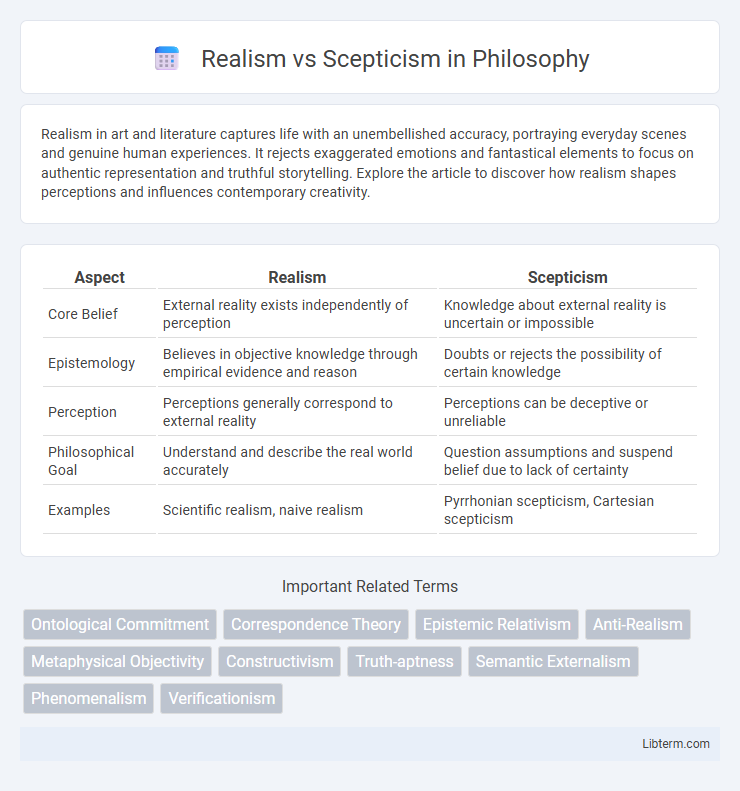Realism in art and literature captures life with an unembellished accuracy, portraying everyday scenes and genuine human experiences. It rejects exaggerated emotions and fantastical elements to focus on authentic representation and truthful storytelling. Explore the article to discover how realism shapes perceptions and influences contemporary creativity.
Table of Comparison
| Aspect | Realism | Scepticism |
|---|---|---|
| Core Belief | External reality exists independently of perception | Knowledge about external reality is uncertain or impossible |
| Epistemology | Believes in objective knowledge through empirical evidence and reason | Doubts or rejects the possibility of certain knowledge |
| Perception | Perceptions generally correspond to external reality | Perceptions can be deceptive or unreliable |
| Philosophical Goal | Understand and describe the real world accurately | Question assumptions and suspend belief due to lack of certainty |
| Examples | Scientific realism, naive realism | Pyrrhonian scepticism, Cartesian scepticism |
Introduction to Realism and Scepticism
Realism asserts that an objective reality exists independently of human perception, emphasizing that knowledge corresponds to the external world. Scepticism questions the possibility of certain knowledge, challenging the reliability of sensory experience and the adequacy of human cognition. The debate between realism and scepticism centers on the trustworthiness of knowledge and the nature of reality itself.
Defining Realism: Key Concepts and Principles
Realism posits that reality exists independently of observers, emphasizing an objective world structured by physical laws and entities. Central principles include the belief in an external reality that can be known through empirical investigation, and that truth corresponds to how accurately beliefs represent this independent world. This framework contrasts with scepticism by affirming the possibility of obtaining reliable knowledge about the universe despite challenges to certainty.
The Foundations of Scepticism: An Overview
The foundations of scepticism center on questioning the possibility of certain knowledge by challenging the reliability of sensory experience and rational inference, which realist philosophy often takes for granted. Sceptics argue that human perception is inherently fallible, and cognitive biases further complicate our ability to attain objective truth, undermining realist claims about a knowable external reality. This epistemological stance has influenced key debates in philosophy, emphasizing doubt and critical inquiry as essential tools for evaluating knowledge claims.
Historical Origins of the Debate
The historical origins of the Realism vs Scepticism debate trace back to ancient Greek philosophy, where Plato's theory of Forms laid the groundwork for Realism by asserting the existence of abstract universals independent of human thought. Conversely, sceptical arguments emerged prominently in the works of Pyrrho and later Sextus Empiricus, who questioned the possibility of certain knowledge, advocating suspension of judgment. Medieval scholasticism further developed this debate, with figures like Thomas Aquinas defending Realism against nominalist and sceptical positions, shaping its philosophical trajectory through the Renaissance and Enlightenment periods.
Major Philosophers: Realists and Sceptics
Realism, championed by philosophers such as Aristotle and Thomas Aquinas, asserts that reality exists independently of human perception, emphasizing objective truth and knowledge through sensory experience and reason. Scepticism, prominently represented by figures like Pyrrho and David Hume, challenges the certainty of knowledge, advocating for doubt and questioning the possibility of attaining absolute truth. The contrast between these positions shapes epistemological debates on the nature and limits of human understanding.
Ontological Commitments: What Exists?
Realism asserts the existence of mind-independent entities and structures, positing that objects, properties, and truths exist regardless of human perception or knowledge. Skepticism challenges these ontological commitments by questioning the certainty and possibility of knowledge about the external world, often suspending belief in the independent existence of such entities. The debate centers on whether ontological commitments to a mind-independent reality can be justified, with realism affirming and skepticism doubting the existence of an objective, knowable world.
Epistemological Questions: Can We Know Reality?
Realism asserts that an objective reality exists independently of our perceptions, emphasizing that knowledge corresponds to this external truth. Scepticism challenges this claim by questioning the possibility of certain knowledge, highlighting the limitations and fallibility of human cognition in fully accessing reality. Epistemological inquiry thus centers on whether our beliefs accurately represent an independent world or are merely constructs shaped by subjective interpretation.
Contemporary Arguments: Realism vs Scepticism Today
Contemporary arguments in the debate between realism and scepticism center on the reliability of perceptual and scientific knowledge amidst challenges from cognitive biases and epistemic limitations. Realists argue that despite these issues, objective reality can be known through empirical methods and rational inquiry, while sceptics emphasize the persistent underdetermination and fallibility inherent in human cognition. Recent discussions also explore the impact of technological advancements and artificial intelligence on our understanding of knowledge, further complicating the tension between accepting truths and questioning their certainty.
Implications of Each Viewpoint
Realism asserts that an objective reality exists independently of our perceptions, implying confidence in scientific knowledge and empirical evidence as means to understand the world. Scepticism challenges the certainty of knowledge, suggesting that all claims should be questioned and that absolute truth may be unattainable, which fosters continuous inquiry but may hinder definitive conclusions. The implications of realism promote trust in objective truths for decision-making, while scepticism encourages critical thinking and caution against dogmatism.
Conclusion: Bridging or Choosing Between Realism and Scepticism
Bridging realism and scepticism requires recognizing the strengths of both perspectives in addressing knowledge claims and the limits of certainty. Emphasizing critical inquiry and evidence-based evaluation allows for a nuanced stance that avoids absolute skepticism while acknowledging the challenges of achieving objective knowledge. This approach fosters a balanced epistemological framework that supports meaningful understanding without dismissing the complexity of truth.
Realism Infographic

 libterm.com
libterm.com